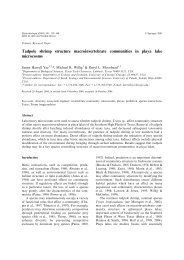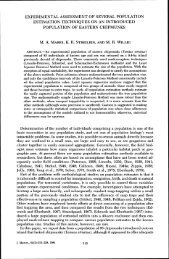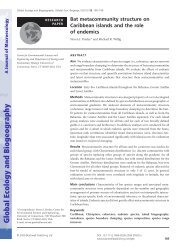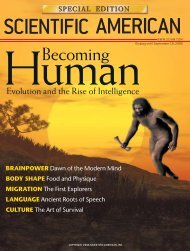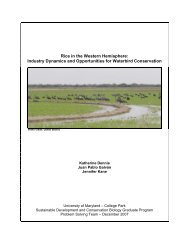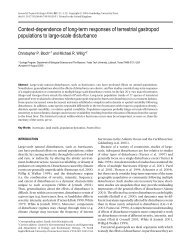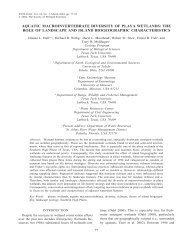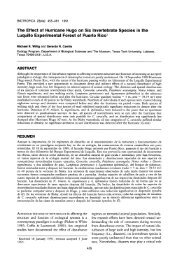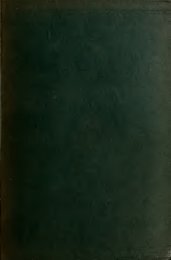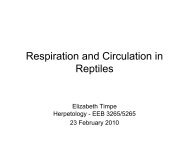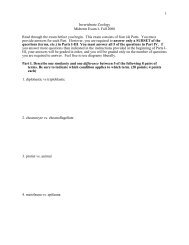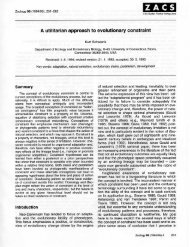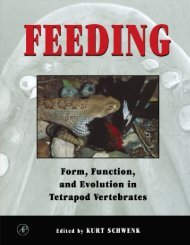Comparative biology and the importance of cladistic classification: a ...
Comparative biology and the importance of cladistic classification: a ...
Comparative biology and the importance of cladistic classification: a ...
Create successful ePaper yourself
Turn your PDF publications into a flip-book with our unique Google optimized e-Paper software.
80 K. SCHWENK<br />
Certainly, Underwood (197 1) was wrong in suggesting that Camp’s (1923)<br />
<strong>classification</strong> <strong>of</strong> squamates has passed <strong>the</strong> critical test <strong>of</strong> predictive power.<br />
Ra<strong>the</strong>r, I submit that Camp’s (1923) paraphyletic <strong>classification</strong> has hindered<br />
<strong>and</strong> falsely constrained our elucidation <strong>of</strong> squamate evolution, not enhanced <strong>and</strong><br />
accelerated it. I fur<strong>the</strong>r suggest that <strong>the</strong> availability <strong>of</strong> a <strong>cladistic</strong> <strong>classification</strong><br />
<strong>and</strong> its incorporation into <strong>the</strong> non-systematic literature would have obviated<br />
many <strong>of</strong> <strong>the</strong> flawed associations <strong>and</strong> generalizations posited at <strong>the</strong> outset <strong>of</strong><br />
sensory studies <strong>and</strong> <strong>the</strong>n promulgated through time. In particular, a <strong>cladistic</strong><br />
<strong>classification</strong> would have suggested <strong>the</strong> natural association between gekkotans<br />
<strong>and</strong> autarchoglossans <strong>and</strong>, on <strong>the</strong> basis <strong>of</strong> <strong>the</strong>ir shared ancestry, is more likely to<br />
have led to correct predictions regarding <strong>the</strong>ir <strong>biology</strong>.<br />
As a final testament to <strong>the</strong> power <strong>of</strong> a <strong>classification</strong> to influence our<br />
interpretations, even in <strong>the</strong> face <strong>of</strong> contradictory evidence, I <strong>of</strong>fer <strong>the</strong> following<br />
passage from Malan (1946: 124). Malan (1946) studied <strong>the</strong> comparative<br />
anatomy <strong>of</strong> <strong>the</strong> squamate nasal capsule <strong>and</strong> hence provided an early study <strong>of</strong><br />
significance to chemosensory <strong>biology</strong>. She was, unfortunately, so influenced by<br />
Camp’s (1923) <strong>classification</strong> that she contradicted herself <strong>and</strong> her own findings,<br />
unwittingly helping to hatch <strong>the</strong> nascent visual-chemosensory dichotomy. I have<br />
quoted this passage elsewhere (Schwenk, 1993b), but it is particularly significant<br />
in <strong>the</strong> present context:<br />
The general type <strong>of</strong> <strong>the</strong> nasal organ occurring in <strong>the</strong> Lacertilia fully supports <strong>the</strong> division <strong>of</strong> <strong>the</strong><br />
order into <strong>the</strong> two subdivisions <strong>of</strong> Camp (1923): <strong>the</strong> Ascalabota comprising <strong>the</strong><br />
Geckonidae, Iguanidae, Agamidae <strong>and</strong> Chamaeleontidae, <strong>and</strong> <strong>the</strong> Autarchoglossa<br />
comprising all <strong>the</strong> remaining families.. . . The Geckonid nasal organ represents an<br />
intermediate type which, though showing an approach to <strong>the</strong> Ascalabota condition in<br />
several characters, isyet so similar to that <strong>of</strong> <strong>the</strong> Autarchoglossa, that, with respect to <strong>the</strong> nasal<br />
region alone, <strong>the</strong> Geckonidae would certainly have to be included in <strong>the</strong> latter subdivision. In <strong>the</strong><br />
remaining Ascalabota a very different type <strong>of</strong> nasal organ is found. [italics added].<br />
Is is insufficient to suppose that comparative biologists who have not consulted<br />
an explicit phylogeny are guilty <strong>of</strong> poor science. Phylogenetic awareness outside<br />
<strong>of</strong> systematic <strong>biology</strong> is a recent phenomenon (e.g. Harvey & Pagel, 1991).<br />
Therefore, it is incumbent on systematists to provide <strong>classification</strong>s that contain<br />
information most likely to lead to correct interpretations <strong>of</strong> comparative data.<br />
The information that will most <strong>of</strong>ten lead to such interpretations is an exact<br />
knowledge <strong>of</strong> <strong>the</strong> branching pattern <strong>of</strong> phylogeny, <strong>and</strong> only a <strong>cladistic</strong><br />
<strong>classification</strong> can communicate this to <strong>the</strong> majority <strong>of</strong> workers in evolutionary<br />
<strong>biology</strong>. Conversely, comparative biologists must seek out phylogenies <strong>and</strong> not<br />
<strong>classification</strong>s to shape <strong>the</strong>ir evolutionary generalizations. Finally, it is worth<br />
noting that many <strong>of</strong> <strong>the</strong> difficulties discussed in this paper arise from an innate<br />
conflict between <strong>the</strong> nested nature <strong>of</strong> phylogenetic hierarchies <strong>and</strong> <strong>the</strong> Linnean<br />
system <strong>of</strong> equal, categorical ranks. Recently, a formal system <strong>of</strong> phylogenetic<br />
taxonomy has been proposed (de Queiroz & Gauthier, 1990; 1992; de Queiroz,<br />
1992) that would obviate this conflict <strong>and</strong> move us towards a taxonomy that is<br />
rooted in evolution. Such a system should be embraced by all comparative<br />
biologists.<br />
ACKNOWLEDGEMENTS<br />
I thank Janine Caira, David Wagner <strong>and</strong> several anonymous reviewers, whose<br />
thoughtful comments improved <strong>the</strong> manuscript.



